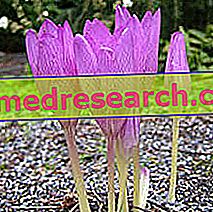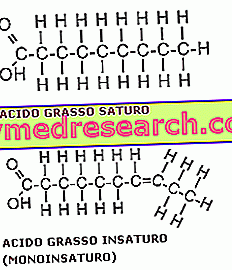
Scientific name
Colchicum autumnale L.Family
LiliaceaeOrigin
Very common plant in ItalyUsed Parts
The drug is given by the bulb, the seeds and the flowersChemical constituents
- Alkaloids (colchicine and colchicoside).
Colchico in Herbalist: Property of the Colchico
The colchic is toxic, both as such and as a phytotherapeutic preparation (for example the dye obtained from the bulbs).
Colchicine can instead be used as a pharmaceutical specialty, under strict medical supervision, in some particular pathologies, such as the acute attack of gout and certain chronic hepatitis.
Biological activity
As mentioned, the colchic is considered a toxic plant, therefore, its use for therapeutic purposes should be avoided.
However, an interesting alkaloid, colchicine, is extracted from this plant, which is still today the active ingredient of medicinal specialties (Colchicina Lirca®) used in the treatment of gout.
In particular, this molecule is able to reduce the inflammatory component typical of the aforementioned pathology. Colchicine, in fact, by acting on granulocytes and inhibiting phagocytosis processes, is able to interfere with the release of lysosomal enzymes, inflammatory mediators and lactic acid, thus reducing the deposition of urates at the level of the synovial tissue.
Colchico in folk medicine and in homeopathy
In folk medicine, the colchicum was used as an anticancer remedy and for the treatment of pathologies such as arthritis and gout.
Furthermore, in the past the colchicum was also used for the treatment of necrotizing vasculitis, psoriasis, condyloma, skin tumors, leukemia, gastrointestinal inflammation, liver cirrhosis, rheumatism, asthma and lice.
Currently, the colchic is used in the homeopathic field, where it can be found in the form of granules and oral drops.
Homeopathic medicine uses this plant in the case of gout, rheumatic disorders, inflammation of the kidneys and the gastrointestinal tract, abdominal pain and distention, flatulence, nausea and vomiting.
The dose of homeopathic remedy to be taken can vary from one individual to another, also depending on the type of disorder that needs to be treated and according to the type of preparation and homeopathic dilution that is intended to be used.
Side effects
Colchic is a very toxic plant. In fact, following its intake, headache, nausea, vomiting, diarrhea, intestinal cramps, haematological disorders, convulsions and asphyxial phenomena may occur. In severe cases and in the event of an overdose, death may also occur.
Moreover, the colchic is endowed with potential teratogenic properties.
Contraindications
Avoid diarrhea and hypersensitivity to one or more components.
Pharmacological Interactions
- sympathomimetic drugs: the association with colchicine can cause an increase in the effects of the aforementioned drugs;
- cyclosporine: increase in the side effects of colchicine.



